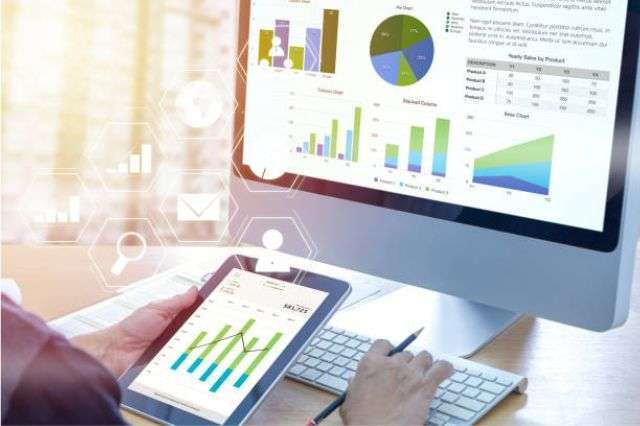The Future of Cloud Accounting: Trends to Watch
In the ever-evolving landscape of finance and business, accounting practices have seen a remarkable transformation in recent years. The adoption of cloud technology has become the latest trend in accounting, redefining how financial data is managed, processed, and leveraged for strategic decision-making. It has become evident that the future of accounting is digital transformation. As we’re standing at the crossroads of innovation, we need to keep a keen eye on the upcoming trends that will shape the future of cloud accounting.
In this blog, we will explore cloud accounting and the trends that can reshape how organizations manage their finances. From artificial intelligence (AI) and machine learning to the rise of blockchain technology and the emphasis on data security and compliance, the future of cloud accounting is dynamic and exciting. Let’s get started.
What is cloud accounting?
Cloud accounting is the term for performing your financial and business tasks over the cloud. It is gaining popularity in the digital world as organizations are rapidly realizing the benefits of moving their accounting to the cloud. It involves storing and processing financial information on remote servers made accessible through the Internet.
This shift is powered by several factors, including its convenience, scalability, cost-effectiveness, and enhanced collaboration features. In many ways, the shift is also driven by the pandemic and the need to introduce a work-from-home culture within the organization.
Why is cloud accounting becoming so popular?
Cloud accounting is becoming immensely popular due to the technology’s numerous benefits over the orthodox on-premises set-up. Some of the most prominent benefits that users look out for are:
- Accessibility: Cloud accounting software can be accessed from anywhere with an internet connection, making it ideal for businesses with remote employees or multiple locations.
- Security: Cloud accounting software providers invest heavily in security measures to protect their customers’ data. This is especially important in today’s increasingly digital world.
- Compliance: Cloud accounting software providers can help businesses comply with a variety of data regulations, such as the General Data Protection Regulation (GDPR).
- Scalability: Cloud accounting software is highly scalable, meaning that businesses can easily add or remove users and resources as needed. This is especially beneficial for growing businesses.
According to recent studies by Clutch, 64% of small businesses now use cloud accounting software. Moreover, the global accounting market is expected to grow from USD 3.7 Billion in 2021 to USD 6.8 Billion in 2027 at a CAGR of 10.46% by the end of 2027, according to 360ResearchReports.
Since the growth is predetermined, let’s take a look at the future trends that will impact Cloud Accounting and allow you to gain the upper hand in the market.
Cloud Accounting Trends to Watch Out in 2024
Trend 1: The Rise of Artificial Intelligence (AI)
Artificial intelligence in cloud accounting can be used in automating tasks like data entry, categorization of expenses, and even predictive financial analysis. AI algorithms can learn from historical financial data to make future predictions and recommendations.
AI can be used to:
- Analyze financial data to identify trends and patterns
- Predict future cash flow and profitability
- Provide real-time insights into business performance
- Automate complex accounting tasks, such as tax preparation and audit reporting
How AI will be used in cloud accounting in the future: In the future, AI is expected to play a more significant role in areas such as fraud detection, natural language processing for financial reporting, and providing real-time insights into financial data. AI-powered virtual assistants may also become essential tools for handling routine accounting tasks.
Trend 2: The Increasing Popularity of Cloud-Based Accounting Software
Why businesses are switching to cloud-based accounting software: Businesses are migrating to cloud-based accounting software such as QuickBooks Cloud due to its accessibility, scalability, and cost-effectiveness. It allows teams to collaborate seamlessly from anywhere, making remote work easier. Additionally, it eliminates the need for expensive on-premises infrastructure.
The benefits of cloud-based accounting software: Cloud-based accounting offers benefits like automatic updates, reduced maintenance costs, real-time data access, and enhanced security. It also allows businesses to scale resources as they grow.
Cloud-based accounting solutions involve using cloud servers to streamline financial operations. This transition to cloud technology is revolutionizing the accounting and tax preparation process, granting businesses access to top-tier software solutions like QuickBooks, Drake, Lacerte, Pro Series, ATX, ProSystem Fx Tax, and UltraTax, regardless of their geographical location.
Deploying software on cloud infrastructure obviates the necessity for costly in-house servers, thanks to its subscription-based model. This approach facilitates real-time access, enabling users to access their data and applications from anywhere with an internet connection, thereby enhancing team flexibility. Furthermore, cloud-hosted solutions offer scalability, allowing firms to adjust their resources according to their specific needs, making them a fitting choice for businesses of all sizes.
Trend 3: The Growing Demand for Real-Time Financial Data
Why businesses need access to real-time financial data: Real-time financial data is crucial for making informed decisions. It helps companies track cash flow, monitor financial health, and rapidly adapt to changing market conditions.
Cloud accounting software enables real-time data access and reporting. Transactions are recorded instantly, and financial reports are generated in real-time, providing up-to-the-minute insights into a company’s financial status.
Trend 4: The Need for More Robust Security Measures
Why security is important in cloud accounting: Security is paramount in cloud accounting to protect sensitive financial data from cyber threats. Breaches can lead to financial losses and reputational damage.
Cloud accounting software providers continually enhance security measures. This includes implementing advanced encryption, multi-factor authentication, and a wireless intrusion detection system. Regular security updates and audits are conducted to stay ahead of evolving threats.
As businesses increasingly rely on cloud infrastructure to store and process sensitive data, the need for robust cybersecurity measures cannot be overstated. Here are key points highlighting the significance of managed cybersecurity in cloud computing:
- Data Protection: Cloud computing involves storing data on remote servers, often managed by third-party providers. Effective cybersecurity measures are essential to safeguard this data from unauthorized access, breaches, or data loss.
- Constant Threat Landscape: The cybersecurity landscape constantly evolves, with new threats and vulnerabilities emerging regularly. Managed cybersecurity teams stay updated on the latest threats and employ proactive measures to protect cloud environments.
- Threat Detection and Response: Managed cybersecurity service providers employ advanced threat detection tools and techniques to identify and mitigate potential threats in real time. This approach helps prevent security incidents.
- Continuous Monitoring: Attacks can occur at any time. Managed services include continuous monitoring, ensuring that potential issues are addressed promptly, even outside regular business hours.
Trend 5: The Importance of Data Compliance
What data compliance regulations businesses must comply with: Businesses must adhere to data compliance regulations such as GDPR (General Data Protection Regulation) and HIPAA (Health Insurance Portability and Accountability Act), depending on their industry and geographic location.
How cloud accounting software can help businesses comply with data compliance regulations: Many cloud accounting solutions offer features that assist businesses in complying with data regulations. This includes data encryption, access controls, and audit trails. Some software providers also offer compliance certifications demonstrating their data security and privacy commitment.
Trend 6: Sustainable Tax Practices with E-filing and Digital Signatures
E-filing and digital signatures offer numerous advantages to tax professionals and their clients, mainly by eliminating the dependency on paper-based filing methods. The adoption of digital signatures not only streamlines processes but also aligns with environmentally responsible practices. Furthermore, the security aspect cannot be overlooked; each signer possesses a unique identifier, ensuring that only authorized professionals can access critical documents.
One significant benefit of digital signatures is their ability to drastically reduce the risk of common filing errors, such as incomplete or missing signatures, often leading to uncertainties in the filing process. The introduction of electronic signatures has resulted in an impressive 80% reduction in signing-related mistakes.
Trend 7: Blockchain’s Role in Ensuring Accuracy
Originally designed to support cryptocurrencies, blockchain technology has transcended its initial purpose, finding applications across diverse industries. Its core attributes of transparency, security, and immutability have made it an asset for organizations.
Leading financial institutions are already exploring blockchain technology to make their system more advanced and future-ready. Most FinTech-based organizations have already introduced blockchain-induced products in the market. Although traditional tech giants that deal in the financial sector wait to get an in-depth understanding, it’s still essential to know the developments going on in the world. Organizations like Verady have developed bridge technology connecting crypto assets, exchanges, and accounting software, and industry leaders like Walmart have initiated beta blockchain implementations in their supply chains.
As far as the technology has evolved, there are three major ways in which blockchain will be able to impact the accounting industry:
- Smart Contracts
- Verifiable Financial Records
- Decentralized, Ledger distribution
Blockchain technology minimizes the potential for fraudulent activities and scams, lowering risks for all accounting stakeholders.
This efficiency also translates to significant time savings for businesses, sparing them from the complexities of fraud disputes and debt recovery from malicious entities.
For international business transactions, blockchain simplifies cross-platform payments by mitigating the complexities associated with varying regulations in different countries.
Also read: Why Use AI and ML for Enhancing Your Data Entry Process
Conclusion
The future of cloud accounting is teeming with promise and potential. As AI-driven automation transforms routine tasks, cloud-based accounting software continues to gain traction for its accessibility and scalability. Real-time financial data and robust security measures are no longer optional but fundamental. Compliance with data regulations is non-negotiable.
In this rapidly evolving landscape, businesses that embrace these trends will gain a competitive edge. They’ll harness the power of AI for data-driven decision-making, leverage the benefits of cloud-based solutions for efficiency and collaboration, and ensure the security and compliance of their financial operations.
As we look to the future of cloud accounting, one thing is clear: the synergy between technology and finance is evolving, and those who adapt will thrive in this exciting new era of financial management.





